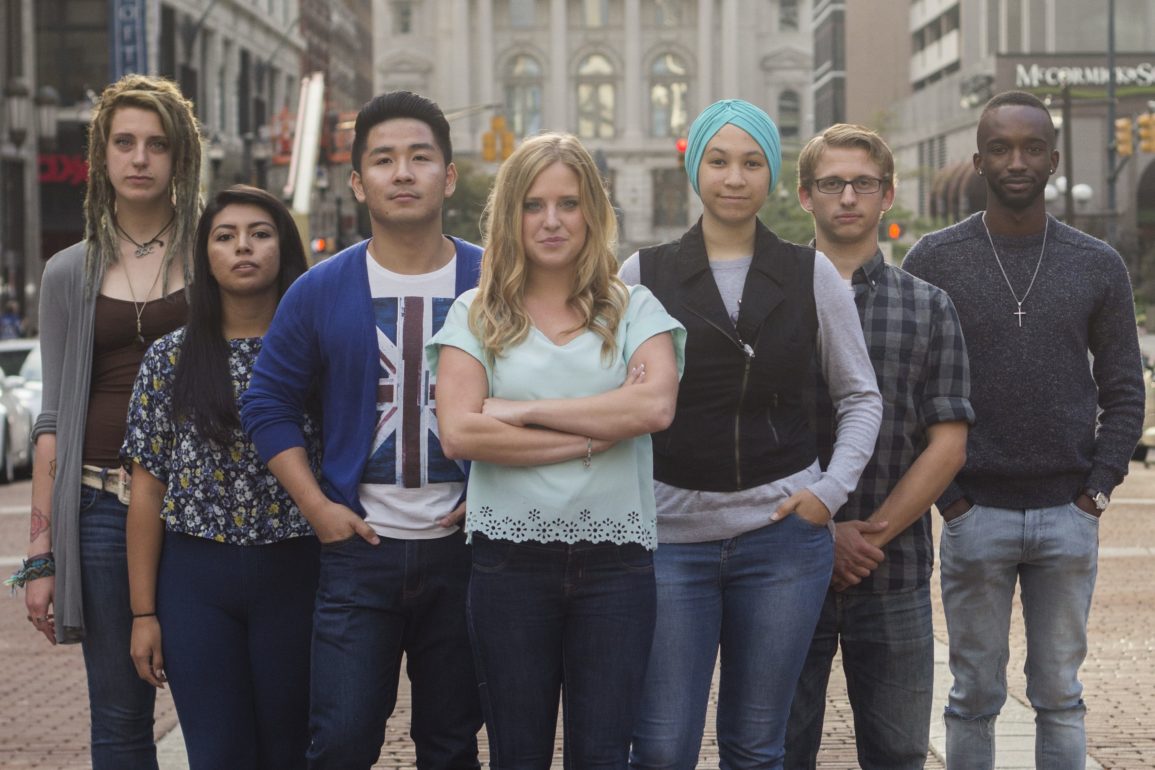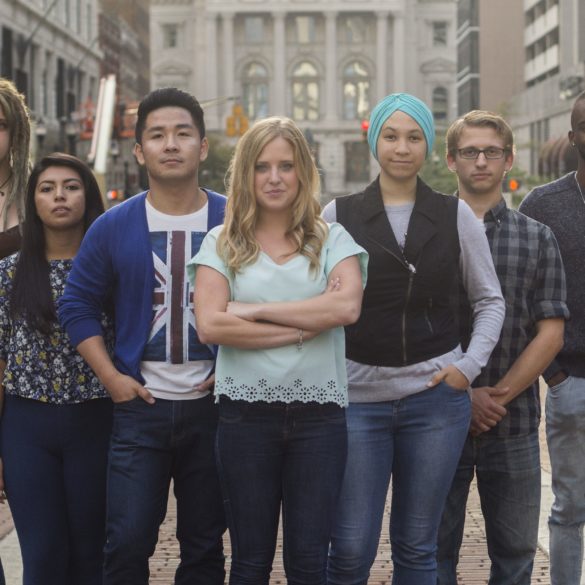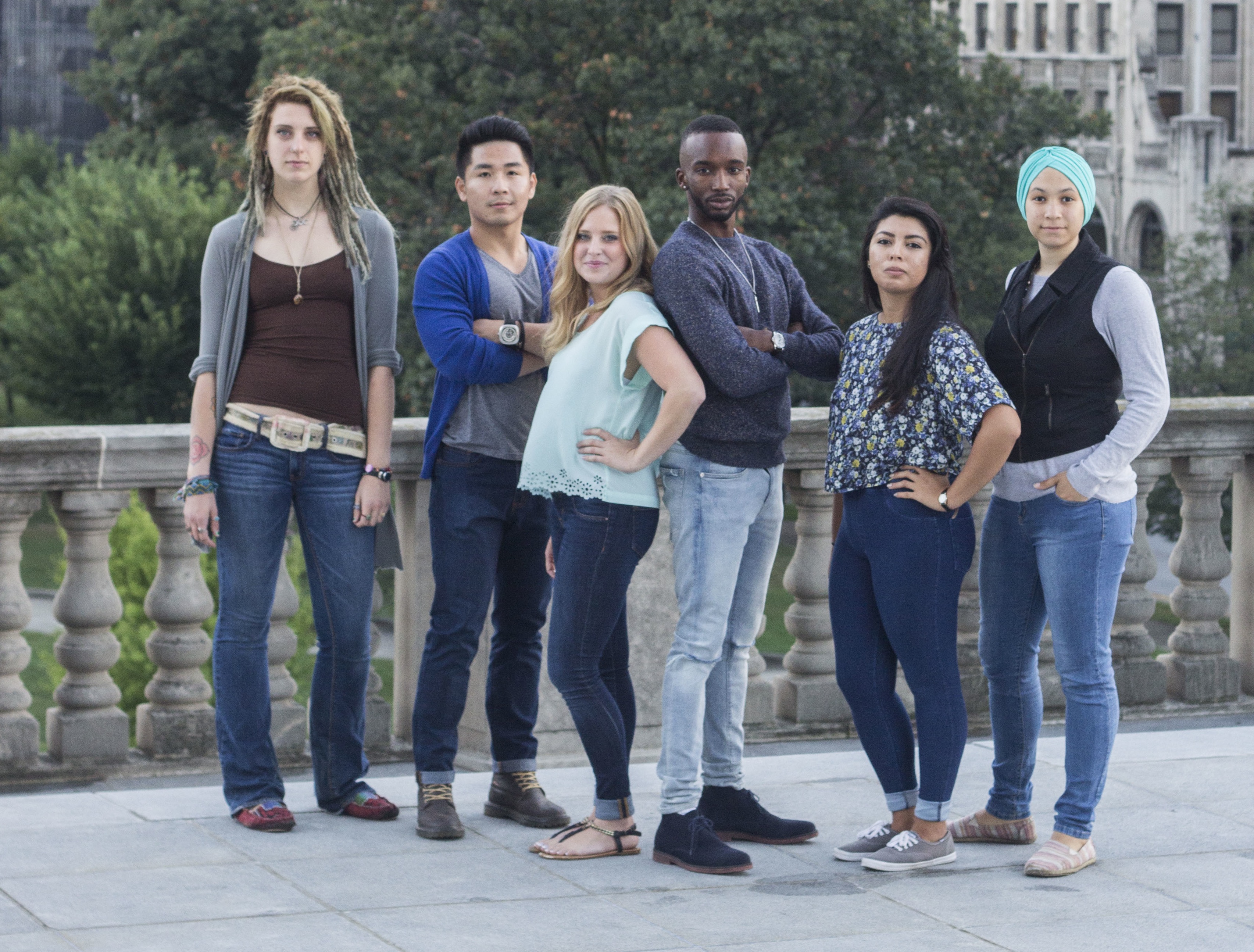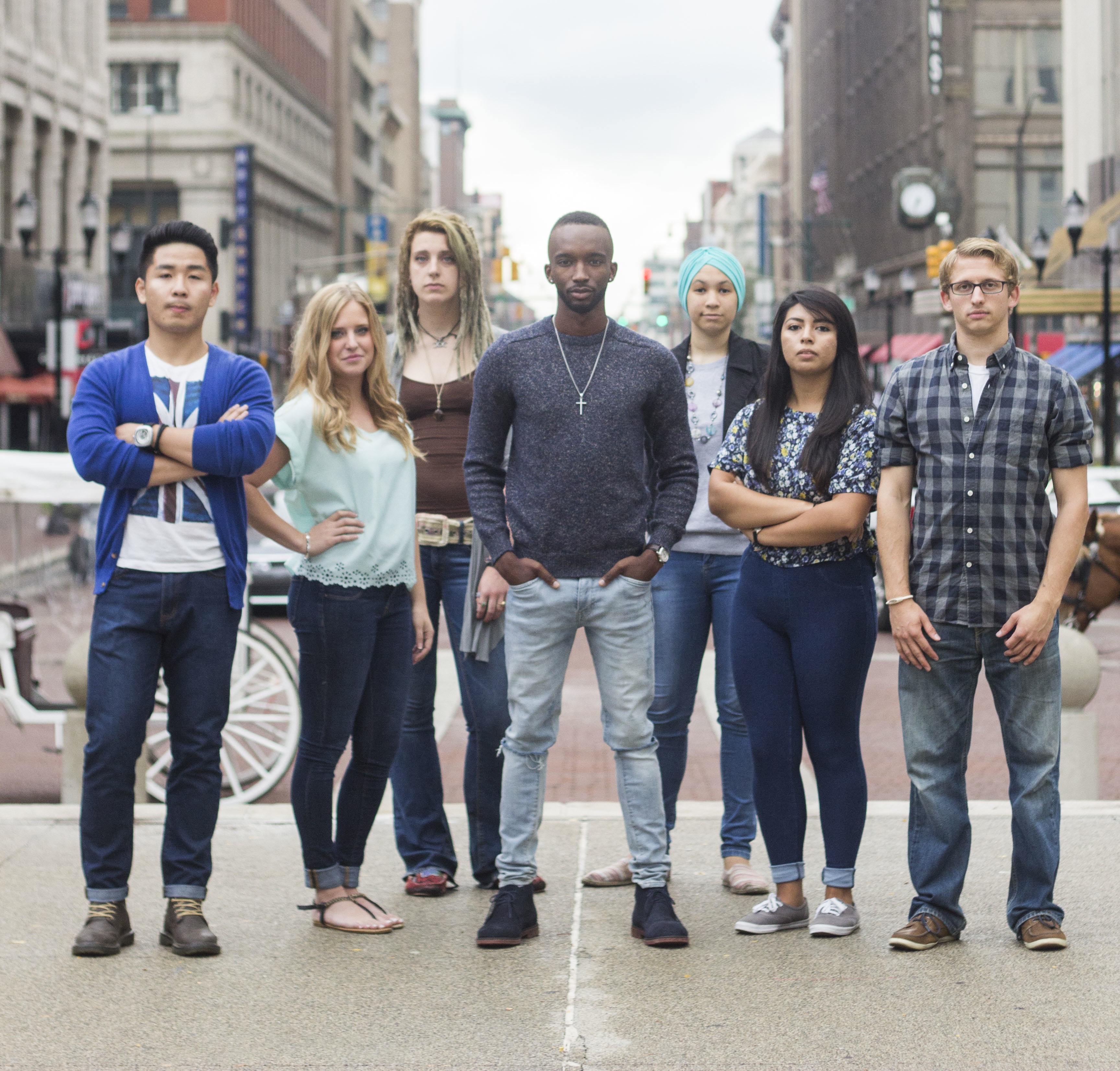The largest generation in history, Millennials are poised to change America. (This article appeared as the cover story in the Fall 2015 print edition of Ball Bearings.)
Inside Elmcroft of Muncie, an elderly man and woman sit doing a crossword puzzle, their heads pressed tightly together. Three other residents at this assisted living center doze off in front of the television, the volume at a maximum level. Another woman stares blankly ahead in the corner. Mary Dixon, 89, wobbles toward the front door, her hands gripped around her walker. Today is a special day. She gets to sit outside on the porch, one of her favorite activities. As Mary and several other women are led outside, they sit down on the wicker furniture and comment on the warm September air. Before long, they begin laughing and talking about their pasts, transported back to a brief moment in time, when they were young.
In 1999, the oldest Millennials were graduating high school while the youngest were turning two years old. It was also the year that the Baby Boomer generation, which has always had an outsized presence, peaked at 78.8 million. In 1999, Mary Dixon, then 73 and a member of the Silent Generation, watched the landscape of America change as the Baby Boomers took over.
Today, as Mary sits on the porch, she talks about the way things were 70 years ago. She grew up without a computer, without a college degree, and with strict moral rules put on her by her mother, which was common for her generation. She has no idea what an iPhone is and she can’t imagine a single mother having children outside of marriage, but her generation has long since lost its voice. As Mary sits outside, enjoying the many years that have passed since she retired from the workforce, several Millennial employees at Elmcroft pull up in their cars, swipe their cards at the front door, and give a friendly hello to Mary and the other women sitting outside.
The Millennial kids who were between the ages of two and 18 in 1999, are now all adults – taking over all aspects of life, love, work, and education. At a projected 75.3 million, Millennials are surpassing the Baby Boomer generation, now projected at 74.9 million people. For the first time in years, a new generation – the largest generation – is on the way to changing America.
Changing the workforce
The parents of 23-year-old Percy Ford, both members of the Baby Boomer generation, want him to move back home after he graduates in May. They want him to get a nine-to-five job, establish himself, and find a career he can stay at. He has other plans.
Percy wants more than a paycheck every two weeks. He wants a job that is fulfilling, means something, and allows him to follow his passions, which include travelling to places beyond his hometown. As he starts a job with these ideals, he will join the largest generation in the workforce.
One in three working Americans is now a Millennial, and within ten years, this generation will make up as much as 75 percent of the workforce. Those who hold power today will no longer hold power, and the world will look dramatically different.
Tamara Montag-Smit, a professor of management with a Ph.D. in industrial and organizational psychology, said Percy’s ideals and values are common in the Millennial generation. She said this Millennial mindset will lead to many workplace changes in several different areas because Millennials have different values.
“If you’re a Baby Boomer, you might look at a Millennial and say they have poor work ethic,” Tamara said. “If you’re Millennials, you look at your life and you say, ‘I have balance. I know how to work when I need to work and have fun when I want to have fun.’”
Tamara described the way Percy feels as he approaches work with his own sets of values that older generations may not understand.
“I think that’s why so many people of older generations say we’re self-centered and kind of just focused on ourselves; when we are coming out of college and growing in the workforce, we aren’t afraid to ask for things our parents weren’t asking for before,” Percy said. “We have different demands and different expectations of our employers and we want those wishes to be respected.”
John Graham, a Millennial marketer and analyst, is one Millennial who searches for fulfillment in the work he does. At 35, he is at the older end of the Millennial spectrum, but he said everything he does stems from his generation and having the Millennial mindset. He works as an analyst during the day and also owns his own company, Ego Free Media, with several personal projects on the side. Part of his job includes looking at and researching what Millennials need in the workplace.
He said the way Millennials view work has changed by the way the recession in 2007 impacted them. After the recession in 2007, national unemployment rates went up to 10 percent, putting many Gen Xers and Baby Boomers out of jobs, and leaving many Millennials with the message that they had to change the way they approached a job.
This recession caused John and many other Millennials to look for “side jobs” in addition to a nine-to-five job. Because they are digitally inclined, John said many Millennials took to the internet to create businesses when the recession hit. This provides young people with the ability and access to create their own revenue stream. He has used these tools to create what he calls “side hustles” and has his own video studio where he records videos about the Millennial generation.
Millennials are approaching work and envisioning success in a different way than any generation before. Mark Zuckerberg, the richest Millennial CEO and owner of Facebook illustrates this. A report by Brookings connects Mark’s actions to the way a world dominated by Millennials and their values might look.
Tamara said that as Millennials like Mark take on leadership roles, workplaces will become dramatically different. “If you compare a place like Facebook, run by Mark Zuckerberg, and Amazon, run by Jeff Bezos, who’s not a Millennial, you see two totally different perspectives and ideals.”
Jeff Bezos, she said, focuses on strong work ethic and the fact that hard work is the only way to get ahead. Mark’s company message is that hard work is important, but that it’s also important to enjoy your job and make sure family needs are met. She said the biggest values of Millennials are a focus on work-life balance, personal care, and wellness programs, all of which are on the rise.
The demands of this generation have led Millennials to leave jobs at a faster rate, John said. He said that the average time period of a Millennial employee is four and a half years at any one company because Millennials will go somewhere else if they aren’t fulfilled in their current job. Or, like in John’s case, they will create side projects and jobs for themselves. “You can merge the two and your passion becomes your profession,” John said.
Tamara said these changes in the workplace won’t happen without hesitation from older generations. But for the Baby Boomers, who are already on the way out of the workplace, her answer is simple: they will retire.
“People are choosing retirement for strategic reasons now,” Tamara said. “Being that things are more financially stable, if you’re a Baby Boomer, your 401k probably looks okay at this point. It might’ve looked really bad seven years ago and you didn’t want to retire then, but I think now people are considering it and they’re moving on. We’re realizing too that it’s time for a new generation to lead the workplace, and maybe their ideas aren’t so bad.”
The most educated generation
When Victoria Myers, now 23, was in high school, she had no idea she would end up in graduate school after receiving her bachelor’s degree. No one in her family had ever gone to graduate school and her mom never went to a university, working to a be hairdresser instead.
Victoria is now a part of the half of Millennials who go on to earn a professional or graduate degree after earning a bachelor’s degree.
As they enter the workforce, Millennials are on track to be the most educated generation ever. About four in ten are still in college, high school, or trade school, and two-thirds of 18 to 29-year-olds who are not in school plan to go back someday.
Today, Victoria looks back on the four years she spent at Ball State University as an undergraduate and remembers one thing in particular: her parents attending the Dean’s List Ceremony for her every semester. Maintaining above a 3.5 GPA throughout college is something Victoria said makes her most proud. She said she thinks there is a greater emphasis on education for her generation.
Tamara said the greater emphasis on education stems from the jobs available now compared to thirty years ago.
“[For] the average Baby Boomer, when they started their first job, most jobs were factory and industry. It’s now tech and white collar. We have a much more educated work force,” Tamara said.
The emphasis on education has increased for women over the years as well. Pew Research reports that 27 percent of 18 to 33-year-old women are completing a bachelor’s degree, compared to 20 percent of Generation X women and 14 percent of Baby Boomer women.
Many Millennials are choosing to stay in school due to the smaller job market. Millennials with a master’s degree are making 23 percent more than those of the same age in 1984, Pew Research reported.
Victoria spent many nights studying for the GRE and making sure her GPA was up, in order to go to graduate school.
Right after high school, she said many people see college as a requirement, especially recently. As the first person in her family to go to graduate school, Victoria chose to pursue more higher education after earning her degree.
“I wasn’t really satisfied with just earning my four-year degree, I wanted to learn more. I’m so intrigued with speech pathology that I want to be the best professional I can be, and grad school would fulfill that for me.”
Although she said she thinks an undergraduate degree can be enough in most cases, she thinks her degree will help her seek a job much more easily than just having a bachelor’s degree.
Tamara said that in today’s job market, there’s a greater emphasis on innovation. She said advanced education helps with that because it helps people to think differently and more creatively.
A look at diversity
Cassie Gabriel, 20, wants to be a teacher, but many people tell her this will come with a problem—she has tattoos they say she will regret. Cassie doesn’t feel the same way. To her, the tattoos are a way of expressing who she is and the struggles she has faced. She got her first tattoo at age 18 on her birthday, a black infinity sign on her wrist. She got her next tattoo only 3 months later.
“Every day [that] I look down at my tattoos, they remind me of how strong I am,” she said.
Cassie will continue to get tattoos until her arm is covered in a sleeve, she said. She understands that her tattoos may come with consequences, but she sees the taboo of tattoos changing even for teachers.
Cassie is one of the four out of ten Millennials who has a tattoo. Individuality and diversity are some of the most defining characteristics of this generation, but the number of inked individuals decreases steadily with the generations. Thirty-two percent of Gen Xers and fifteen percent of Baby Boomers say they have only one tattoo. Only six percent of Mary’s Silent Generation had a tattoo. Mary never had a tattoo, but she sees it as a way of expression today.
In mid-September at Elmcroft, the assisted living center put on an event called Second Wind Dreams, where residents can live dreams they weren’t able to carry out when they were younger.
Mary rolled up the legs of her pants and revealed a peeling, rainbow, temporary tattoo. “I got this last week,” said said, smiling. While very few people in Mary’s generation had a tattoo, she is satisfied with her temporary body art – a symbol of something she never got to do in her youth.
Millennials, as well as the other generations, prefer hidden body art. Pew Research reports 70 percent of Millennials with one tattoo say they keep it hidden. Millennials also lead the generations in piercings: 23 percent say they have a piercing outside of their earlobe. Along with tattoos, Cassie has nine piercings, none of which she regrets.
This is a small insight into the way Millennials are expressing themselves. Today, Millennials are a part of the most diverse generation to date, with only 56 percent of the population being white, CNNMoney reports. Seventy-nine percent of the Silent Generation was white, 72 percent of the Baby Boomer generation is white, and 62 percent of Generation X is white.
Physical individuality isn’t the only statement this generation is making. Half of Millennials describe themselves as political independents and almost three-in-ten say they aren’t affiliated with religion, Pew Research reports. Despite this, Generation Y is voting on many issues older generations don’t show the same support for, whether it’s legalizing marijuana or same-sex marriage.
Redefining relationships
When Riley Gray came out to her parents as bisexual her sophomore year, the mood was light and easy. The conversation was unplanned. In an emergency surgery, Riley had just had her gallbladder removed and was under heavy pain medication.
“It just came out,” Riley laughed.
Her mother responded gracefully, “You are who are you are, and I love you exactly the way you are.”
Her dad and siblings also responded positively. In her immediate family, nothing changed. When Riley began opening up to her extended family members, they were accepting, but not promoting.
Riley is still not able to be open with some members of her family. Riley’s great-grandmother is a member of the Silent Generation. She was married at age 16, which was typical at that time. Between the ages of 18 to 32, 65 percent of the Silent Generation was married, according to Pew Research. Twenty-six percent of Millennials married at that same age. Although she never went to college and never entered the workforce, she worked diligently every day to maintain their home, cooking and cleaning, and to take care of their four children. She believes in strict, conservative values, meaning premarital sex and homosexuality are both immoral.
“It breaks my heart, that my great-grandmother will never really know 100 percent who I am.” Riley said. “But I would still rather have in her my life thinking I’m straight, than to pass away and hate me.”
Riley thinks it’s too late for her great-grandmother to understand and accept her sexuality. Bisexual was not a term her great-grandmother knew or understood growing up, or a term she will ever know.
“You can’t teach or explain an idea they’re so resistant to,” she said.
Tamara said that naturally, people are less likely to adapt as they get older. “If you thought the sky was blue for 80 years and someone finally told you it was purple, you’re gonna say ‘I don’t care about the sky anymore.’”
Older people do not adapt well, but that is not the case for young people, Tamara said. Riley’s peers, for the most part, have always been accepting of her bisexuality. Except for the occasional straight male who sees her as a fetish, she feels that her sexuality is embraced and celebrated. As a generation, Millennials accept many different types of sexualities.
From rainbow-filtered social media pictures to adapting the “love is love” slogan, the majority of Millennials display their support of acceptance and use social media to do so. In fact, Millennials are the only generation in which the majority favors the legalization of gay marriage, at 59 percent, compared to 33 percent of the Silent Generation.
Riley said unlike her mother, who grew up in a Catholic family with 12 kids, she was not expected to marry and have children at a young age. She said this shift in ideas is changing the dynamics of millennials’ relationships. The number of adults who have never been married is at an all-time high according to Pew Research, and Millennials are waiting longer to enter marriages.
In relationships, there are many options, Riley said. Unlike her parents and grandparents, who followed a strict step-by-step process of dating, engagement, and marriage, there are more possibilities for Millennials. Relationships can range from just the enjoyment of sex without an emotional bond to serious dating relationships, and all are accepted.
“The end goal isn’t always to get married,” Riley said. “The end goal might just be finding someone who understands you in a way that other people don’t. Or finding someone that you just enjoy spending your time with.”
Millennials don’t follow a cookie cutter outline for relationships and many are even label-free, contributing to the delay in marriage. They also don’t feel the need to have children at a young age. According to Pew Research, the birth rates for women under age 30 have been declining for more than a decade. Riley doesn’t plan to have children in the future, but she said that could change. She is certainly open to change.
Change is coming
As the rest of the Baby Boomer generation continues to retire, a major shift will take place in America. Generation X, often called the “middle child” between two larger generations, will not have the impact Generation Y will have as the Baby Boomers start to dwindle and leave the workplace. As young immigrants continue to add to Generation Y, this generation continues to grow. By 2036, Pew Research projects the Millennial population will peak at 81.1 million.
At Elmcroft of Muncie, Mary’s porch time is almost up, and soon she will be led back into the assisted living facility. Time on the porch is a special treat for residents, especially on a day like this one in September. She points to a tree in the distance. “The leaves are already turning colors,” she says, smiling. “Things are really starting to change.” And they are.
As the most diverse generation to date, Millennials are already leading the workforce. They are emerging as the most educated generation, changing the way politics and religion are viewed, and causing a major shift in life and love. It is as if, with their numbers still on the rise, this group of Americans is saying “we are coming,” bringing so many changes to the way life now runs in America.






